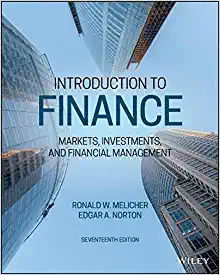Question
Very confused, please help ! 1. For what compounding period is the nominal rate equal to the periodic rate and equal to the effective rate?
Very confused, please help !
1. For what compounding period is the nominal rate equal to the periodic rate and equal to the effective rate?
2. If the periodic rate is 8% and the compounding period is semiannual, what is the nominal rate?
3. Describe the difference between an annuity due and an ordinary annuity.
4. Describe the two circumstances in which an effective rate is used.
5. What is the periodic rate of a 12% nominal rate with quarterly compounding?
Show inputs and final answer. Show all your work for full credit.
1. You want to save your money for a down-payment on a home in ten years. You currently have $5,000 invested today at a 5% rate compounded annually. You plan to deposit $1000 at the end of each year for ten years. What is the maximum amount you will have at the end of ten years?
2. You find out you will inherit $100,000 in six years. If the current interest rate is 5% compounded quarterly, what is the present value of your inheritance?
- 3. You plan to deposit the following amounts in your savings account at the beginning of each year. In Year 1, you plan to deposit $3000. In year 2 and Year 3, you plan to deposit $4000 and in Year 4 and 5, you plan to deposit $5000. Assume the savings account earns 3.5% compounded annually. If you do as you plan, how much will you have at the end of ten years?
4. You plan to deposit the following amounts in your savings account at the beginning of each year. In Year 1, you plan to deposit $3000. In year 2 and Year 3, you plan to deposit $4000 and in Year 4 and 5, you plan to deposit $5000. Assume the savings account earns 3.5% compounded semiannually. If you do as you plan, how much will you have at the end of ten years?
- 5. You deposit equal payments of $1000 in the bank for the next 5 years only. Assume the payments are made at the end of the year. What is the interest rate that you would earn if you have $6,200 at the end of five years? Assume annual compounding. Does your equal payment period match the compounding period?
- 6. Assume you receive payments from an investment at the end of each year. What is the present value of an investment that promises to pay the following: $240 received at the end of each year for 3 years. Assume an 8% interest rate compounded semiannually. Does your equal payment period match the compounding period?
- 7. You deposit equal payments of $1000 in the bank for the next 6 years. Assume the payments are made at the beginning of each year. What is the nominal interest rate you earn if you have $8,000 at the end of six years with annual compounding? Does your equal payment period match the compounding period?
- 8.Youdepositequalpaymentsof$1000inthebankforthenext5yearsonly.Assumethepaymentsaremadeattheendoftheyear.Whatistheinterestratethatyouwouldearnifyouhave$6,200attheendoffiveyears?Assumeannualcompounding.Doesyourequalpaymentperiodmatchyourcompoundingperiod?
B. Loan Amortization You borrowed $5,000 from the bank. You plan to pay it back in three years. You are charged 6% annual compounding. Complete the following table.
| Year | Beginning Balance | Total Payment | Interest Paid | Principal Paid | Ending Balance |
| 1 | |||||
| 2 | |||||
| 3 |
Step by Step Solution
There are 3 Steps involved in it
Step: 1

Get Instant Access to Expert-Tailored Solutions
See step-by-step solutions with expert insights and AI powered tools for academic success
Step: 2

Step: 3

Ace Your Homework with AI
Get the answers you need in no time with our AI-driven, step-by-step assistance
Get Started


